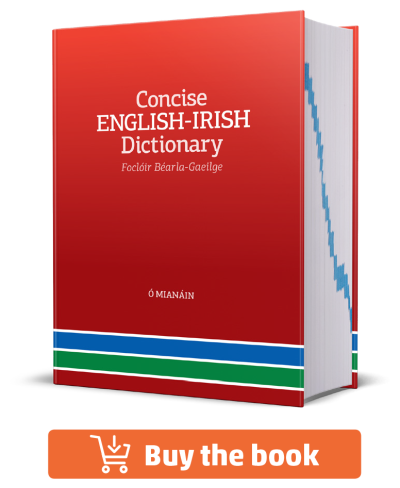Foclóir Gaeilge–Béarla
Ó Dónaill, 1977
An Foclóir Beag
Ó Dónaill & Ua Maoileoin, 1991
English–Irish Dictionary
de Bhaldraithe, 1959
Grammar
Pronunciation
samplóir
samplóireacht
sámsáil
samsaire
samsálaí
samúraí
san
-san
San Mairíneach
sanas
sánas
sanasaí
sanasaíoch
sanasaíocht
sanasán
sanasánaí
sanatóir
sancam soncam
sanctóir
sandarac
sann
sánn
sánna
-san2, emphatic suff. 1. (Used after poss. adjective 3 sg. m. & 3 pl. with nouns or adjectives ending in broad consonant or broad vowel) Tá a theachsan cois na trá agus a dteachsan ar an ard, his house is by the strand and their house on the hill. A mhac mórsan agus a bpáistí beagasan, his grown-up son and their little children. 2. (With 3 pl. synthetic verb form -(e)adar) Ach rinneadarsan an obair, but it was they who did the work. 3. (With 3 pl. pers. prons. and 3 sg. m and 3 pl. prep. prons. ending in broad consonant or broad vowel) Bhí siadsan anseo romhainn, they were here before us. Ná creid iadsan ach mise, believe me, not them. Dósan a thug mé é, it was to him I gave it. Acusan a bhí sé, it was they who had it.
San1, s. (Title) Saint. ~ Doiminic, St. Dominic. ~ Caitríona, St. Catherine. ~ Nioclás, St. Nicholas, Santa Claus.
san3 : i2.
san4 = sin1.
RELATED MATCHES
IN FOCLÓIR GAEILGE—BÉARLA
REVERSE SEARCH
IN FOCLÓIR GAEILGE—BÉARLA
PHRASES
IN FOCLÓIR GAEILGE—BÉARLA
Duine a fhágáil san ~, to leave s.o. in the lurch.
Tá ~ maith san éadach sin, there is good stuff in that cloth.
Léim a thabhairt (in airde) san ~, to jump into the air.
Thuas, in airde, san ~, up in the air.
Caint san ~, nonsensical talk.
Níl lá san ~ nach dtagann sé, he comes every single day.
Rud a chur in, san, ~, to blow sth. sky-high.
Chaith sé in, san, ~ é, he threw it up, abandoned it.
Bíonn uain ag na caoirigh san earrach, the sheep have lambs in the spring.
Bán, dubh, san ~, pale-, dark-, faced.
Tá an bháisteach san ~ orainn, the rain is in our faces.
Tá dúil aige san ól. Is iomaí duine ar a ~. He is fond of drink. It is a common affliction.
Ná tabhair ~ duit féin amuigh san fhearthainn, don’t soak yourself, ruin your health, out in the rain.
San ~ sin, in that direction.
San ~ ó dheas, in the south, southwards.
San, ag, ~ ar, watchful over; on the alert against.
Rud a chur san ~, to take sth. into account; to include sth.
Agus an dá lá (a chur) san ~, both days (to be) included.
Tá ~ cinn san fhear sin, that man is clever.
Ní hé sin an chiall atá leis san ~ eile, that is not what it means in the other passage, context.
Tá sé san ~ orm, it is in my way.
San ~ atá le teacht, in the time to come.
San ~ fadó, in olden times.
Tá sé san ~ agat pósadh, it is time for you to get married.
San ~, ag an ~, céanna, at the same time.
Míle ~ san fharraige, a mile out to sea.
Níl aon ~ aige san anró, he is unconcerned about hardship.
Chuaigh sé d’aon léim ~ isteach san abhainn, he took one jump, jumped suddenly, into the river.
Bhí siad fairsing san áit seo (aon) uair ~, they were plentiful in this place formerly.
Dul san ~ le rud, to venture, take a chance on, sth.
Tá mé in ~, san ~, an bhfuil an ceart agat, I am doubtful whether you are right.
~ san Afraic, out in Africa.
Tá mé scilling ~ san áireamh, I am out a shilling in the computation.
de (> den), do (> don), i (> sa, san before
Chuala mé an scread san oíche, I heard a (sudden) scream in the night.
Dúirt mé leis dul san ~ leis, I told him to go to the dickens with it.
Tá an ~ briste aige; tá sé briste san ~, he is broken-winded.
~ san ól, sa tobac, craving for drink, tobacco.
Go h~ san oíche, late at night.
San ~ a bhfuil sé ann, ina bhfuil sé, at his age, time of life.
San ~ leanbaí, leanbaíochta, in dotage, in second childhood.
Tá sé ag titim san ~, he is getting old-looking, decrepit.
Fan san ~ air, keep the advantage over him.
Duine a ardú san intinn, to excite, anger, s.o.
Dul san ~, to join the army.
In ~ san fheamainn, entangled in the seaweed.
San ~, in the new year.
Bhain sé faoi san áit seo nuair a bhí sé tuirseach den siúl, he settled down in this place when he was tired of travelling.
3. Thar a bhaint san uisce, out of his depth in the water.
Is beag dá bharr a bhí agam mé féin a bhá san fhearthainn, little I gained by getting myself drenched in the rain.
